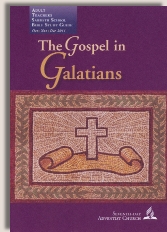|
||||||||||||||
Commentary on "Justification by Faith Alone"
Day 5: Wednesday, October 19, 2011 - The Obedience of Faith
Overview
The lesson today discusses "the obedience of faith". It states that biblical faith "is always a response to God." It clarifies that faith is not a feeling or attitude that a person decides to have but that it "originates in a heart touched with a sense of gratitude and love for God's goodness." It then gives the example of Abraham whose faith was "his response to the amazing promises God makes to him," while Paul says that faith "is rooted in our realization of what Christ did for us on the cross."
The lesson ends with these two paragraphs:
"Many people define faith as "belief." This definition is problematic, because in Greek the word for "faith" is simply the noun form of the verb "to believe." To use one form to define the other is like saying "faith is to have faith." It tells us nothing.
"A careful examination of Scripture reveals that faith involves not only knowledge about God but a mental consent or acceptance of that knowledge. This is one reason why having an accurate picture of God is so important. Distorted ideas about the character of God actually can make it more difficult to have faith. But an intellectual assent to the gos-pel is not enough, for, in that sense, "even the demons believe." True faith also affects the way a person lives. In Romans 1:5, Paul writes about the "obedience of faith." Paul is not saying that obedience is the same as faith. He means true faith affects the whole of a person's life, not just the mind. It involves commitment to our Lord and Savior Jesus Christ, as opposed to just a list of rules. Faith is as much what we do and how we live and in whom we trust as it is what we believe." (Adult Sabbath School Bible Study Guide, Oct-Nov-Dec 2011)
Observations
This lesson assumes several things without ascertaining what is really biblical truth. First I will address the lesson's statements about Abraham and "faith". The author says that faith is a response that flows out of "gratitude and love for God's goodness" and that it always follows "initiative that God has taken." Abraham's faith, the lesson says, was a response to God's promises. The Genesis account, however, does not support this analysis. Genesis 15:1-6 says this:
After these things the word of the LORD came to Abram in a vision: "Fear not, Abram, I am your shield; your reward shall be very great." But Abram said, "O Lord GOD, what will you give me, for I continue childless, and the heir of my house is Eliezer of Damascus?" And Abram said, "Behold, you have given me no offspring, and a member of my household will be my heir." And behold, the word of the LORD came to him: "This man shall not be your heir; your very own son shall be your heir." And he brought him outside and said, "Look toward heaven, and number the stars, if you are able to number them." Then he said to him, "So shall your offspring be." And he believed the LORD, and he counted it to him as righteousness.
This passage does not say Abraham had "faith", although this passage does describe faith. It is important to understand, however, that this passage accurately identifies Abraham's response to God as "belief". It is Abraham's belief in God that was his faith. Faith was not a response to God's generous promises and undeserved call to Abram. Faith is trust and belief in God. That faith is not an outflow of gratitude but a decision to believe God and to let go of one's control over one's own destiny and allow God to have him—past, present, and future.
The next verses of this Genesis passage do not describe a man overflowing with gratitude. Abram, in fact, was not feeling gratitude for anything yet. He knew that God had promised him seed, land, and blessing, but he was not seeing any evidence of these promises being fulfilled. In fact, he asks God in verse 8 how he was to know that he would really possess the promised land, and God doesn't tell him how he'll know; instead, he instructs Abram to prepare sacrifices to cut a covenant with Him.
Abram cuts up the required animals and waits for God to appear and make His covenant with him...and God puts Abram to sleep. God Himself cuts the covenant in the form of a smoking pot and a flaming torch—representative of the Father and the Son with foreshadowings of the Mosaic covenant (smoking pot/Sinai) and the new covenant (the Light of the world/the Lord Jesus).
At no point in this story does Abram demonstrate gratitude or love for God. He actually demonstrates questions and surprise, but he chooses to believe God. He puts his entire future into God's hands and believes that God will keep His promises even if he never sees the realization of those promises. This belief in God without any evidence of how His promises will come true is the example of faith that the New Testament tells us is the sort of faith we are to have.
Belief
The lesson says that it's problematic to define faith as "belief" because "faith" is the Greek noun for of the verb "to believe", and the author argues that this definition involves circular reasoning. Yet this is exactly the definition of faith. Faith is belief in God's faithfulness to keep His promises. That's all there is to it.
Moreover, the lesson lists several texts that are to teach us the origin of faith. The texts are great texts, but they do not directly address the origin of faith. The text that directly explains faith's origin is not listed: Ephesians 2:8-9:
For by grace you have been saved through faith. And this is not your own doing; it is the gift of God, not a result of works, so that no one may boast.
This text actually says that being saved through faith is a gift of God. The faith and the salvation are from God; faith is not something we do in response to God. Faith is a gift God gives us; we cannot trust God without His intervention in our lives because we are born spiritually dead. We do not seek God. We can only have faith when God gives us faith—and we must be willing to receive it. Faith is not some sort of decision to believe. It is surrender; it is trust in the One who is Real. It is giving up our control of our outcomes and trusting God to save us through the miracle of Jesus' blood shed for our sin. God gives us this ability to trust, and we appropriate it.
The lesson tries to make the point that "faith" is commitment to Jesus and also "what we do and how we live". Wrong. What we do and how we live are the fruit of faith. Those things are not components of faith.
The New Bible Dictionary from Inter-Varsity Press says this about faith: "Faith is the attitude whereby a man abandons all reliance in his own effort to obtain salvation, be they deeds of piety, of ethical goodness or anything else. It is the attitude of complete trust in Christ, of reliance on hm alone for all that salvation means."
Romans 1:5
The lesson refers to Romans 1:5 to say true faith affects the way people live. The author says, "In Romans 1:5, Paul writes about the ‘obedience of faith.' Paul is not saying that obedience is the same as faith. He means true faith affects the whole of a person's life, not just the mind. It involves commitment to our Lord and Savior Jesus Christ, as opposed to just a list of rules. faith is a much what we do and how we live and in whom we trust as it is what we believe."
Again, the author has misrepresented what Scripture says. Here is the context:
Paul, a servant of Christ Jesus, called to be an apostle, set apart for the gospel of God, which he promised beforehand through his prophets in the holy Scriptures, concerning his Son, who was descended from David according to the flesh and was declared to be the Son of God in power according to the Spirit of holiness by his resurrection from the dead, Jesus Christ our Lord, through whom we have received grace and apostleship to bring about the obedience of faith for the sake of his name among all the nations, including you who are called to belong to Jesus Christ,
To all those in Rome who are loved by God and called to be saints:
Grace to you and peace from God our Father and the Lord Jesus Christ. (Romans 1:1-7 ESV)
In context, Paul, indeed, is saying that "obedience of faith" is believing in the Lord Jesus. He is saying that he received from Jesus both grace and the work of apostleship for the purpose of bringing about the "obedience of faith for the sake of his name among all the nations". Paul's work was to teach the gospel so gentiles as well as Jews would come to faith in Christ. The obedience of faith that he was to bring about was believing in the Lord Jesus.
This passage is NOT saying that Paul's work was to bring about acts of law-keeping and righteousness. He work was to bring about saving faith, or belief in the Lord Jesus Christ.
The lesson also makes the point that in order to have faith, it's important to have an "accurate picture of God". It then says that "distorted ideas about the character of God actually can make it more difficult to have faith."
This is an Adventist notion, not a biblical notion. The Bible doesn't ask us to understand God's character; it asks us to believe Him. His word has revealed the truth, and our responsibility is to accept His word and act on it. We are to believe—without having all our questions answered or satisfying intellectual systems worked out to understand God. God's character is revealed through Scripture, and insight follows—not precedes—obedience.
Summary
- The obedience of faith is exactly that...the obedience of believing in the Lord Jesus.
- Faith is believing in God, trusting Him to keep His promises because of Jesus' sacrifice and resurrection.
Copyright 2011 BibleStudiesForAdventists.com. All rights reserved. Revised October 18, 2011. This website is published by Life Assurance Ministries, Glendale, Arizona, USA, the publisher of Proclamation! Magazine. Contact email: BibleStudiesForAdventists@gmail.com.
The Sabbath School Bible Study Guide and the corresponding E.G. White Notes are published by Pacific Press Publishing Association, which is owned and operated by the Seventh-day Adventist church. The current quarter's editions are pictured above.
Official Adventist Resources
Standard Edition Study Guide Week 4
Teacher's Edition Study Guide Week 4
Easy Reading Edition Study Guide Wk 4
Search the Complete Published Ellen G. White Writings
Please Support This Project


